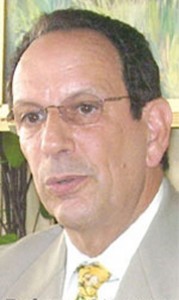Drug smuggler Roger Khan’s spy computer remains a hot issue, featuring in two of the 14 new charges against his former lawyers.
Robert Simels and Arianne Irving, who had been charged with witness tampering jointly with Khan, were slapped with 14 charges in a superseding indictment earlier this week, two of which involve the eavesdropping equipment. Khan had thrown in the towel on this charge also, as well as the gun running charge he had faced in Vermont.

Simels and Irving now face one charge of conspiracy to obstruct justice, eight charges of attempting to obstruct justice, one charge of attempted witness tampering, one charge of importation of eavesdropping equipment, one of possession of such equipment and one charge of bribery while Simels faces a separate charge of making a false statement.
According to the superseding indictment seen by Stabroek News, between September 2007 and October 2007, Simels and Irving, together with others, did knowingly and intentionally send through the mail electronic devices, knowing and having reason to know that the design of such devices rendered them primarily useful for the purpose of the surreptitious interception of wire, oral and electronic communications.
US law enforcement officials allege that between September 2007 and September 2008 the two together with others, knowingly and intentionally possessed electronic devices knowing that they were primarily used for surreptitious interception of wire, oral and electronic communications and that the devices had been sent through the mail and foreign commerce.
Earlier this year, US officials had indicated that the equipment, which was originally seized from Khan at Good Hope in 2003, was recovered from Simels’ New York law offices. However, local police have maintained that they are in possession of the equipment.
Commissioner of Police Henry Greene in the presence of President Bharrat Jagdeo, following Jagdeo’s announcement that the police had the equipment, maintained that his force was in possession of the `spy’ equipment that was seized from Khan back in 2003.
When asked what the force was going to do with the equipment and why it has not been used to track some of Khan’s former associates, the commissioner who had initially offered “no comment” said it would be “used as evidence.”
President Jagdeo had questioned why the press was not exploring the possibility that there could be two lap tops, one which the force has and one which indeed was shipped to the US.
“How do we know it is the same equipment?” the President had questioned and added “…that point doesn’t seem to be explored in the press, if this guy could have bought one equipment he could have bought several it could be true he had one which they carried overseas and it may be too that the police has one. What makes you think it is one he had?”
According to court papers seen by Stabroek News, the specialised telephonic equipment allegedly used by Khan was among the items seized from the New York office of Simels during an investigation.
Questions had been raised as to what had happened to the equipment, which members of the Guyana Defence Force’s (GDF) Intelligence Unit had discovered in 2002 in a vehicle Khan and others were in. It has since been alleged that Khan used the equipment to improperly wiretap the calls of various high-ranking officials and others in Guyana in order to maintain his operations.
In an affidavit in support of a search warrant executed on Simels’ office, Drug Enforcement Administration (DEA) officer Cassandra Jackson said the equipment was shipped by the lawyer to his York Avenue, New York office.
She said Simels had planned to use conversations recorded on the equipment during Khan’s trial.
Jackson said information about the equipment was gleaned during recorded conversations between Simels and the US government’s confidential source. The government’s source informed the DEA that prior to his arrest Khan had used a computer in Guyana to surreptitiously record telephone conversations of individuals.
Jackson said she believed the conversations referred to by Simels were captured using Khan’s eavesdropping equipment that was in his possession. Records maintained by the Department of Homeland Security’s, Bureau of Customs and Border Protection, show that on or about October 11, 2007, prior to the disclosure of the recorded conversations, equipment identified as a ‘Portable Auto Data Processing Machine’ was shipped from Guyana to Simels.
Jackson said the records indicated that from October 9, 2007 to October 12, 2007, Simels was in Guyana and in one of the recorded conversations with the source he had confirmed that he had the equipment.
The US government was granted permission to seize the equipment and other computers and material from Simels’ office following his arrest and the information is now being sifted through by court-appointed persons.
Stabroek News had been told that surveillance equipment, which was confiscated from Khan when he was arrested in 2002, had been handed over to the government, but subsequently returned to Khan. Stabroek News learned that similar equipment might have then been handed over to the police.
At one time, the army had said that it had turned over the equipment to the police but the police later said they did not know of its whereabouts.
Reports had indicated that the lap top was capable of intercepting and tracing telephone calls placed from a landline or a cellular phone and the software was reportedly only sold to governments.
The then home affairs minister Ronald Gajraj had said that its use did not breach any of the laws of Guyana.
Last year, Simels had said that Khan had received permission from the Guyana government to purchase the equipment from the Spy Shop in Fort Lauderdale, Florida, an allegation the government had denied.





